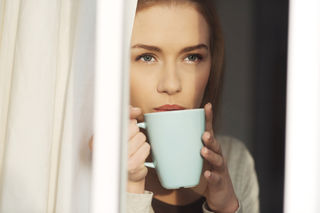We prize coffee as much for its caffeine jolt as for its rich taste and enticing aroma. The right amount of caffeine at the right time can boost your alertness,memory, and attention. But overindulge, and you may pay the price with insomnia, headaches, and even caffeine jitters.
Experts say the upper limit for healthy caffeine consumption is 300 to 400 mg per day for a typical adult. That’s a max of three to four eight-ounce cups of coffee daily—or two to three cups, if you also consume caffeine from other sources, such as tea, chocolate and over-the-counter cold medicine. Some individuals—such as pregnant or breastfeeding women, and those especially sensitive to caffeine—need to aim even lower.
The good news: You can get the mental perks of coffee without overdoing the caffeine. The key is making every cup count. And one of the best ways to do that is to carefully choose when to partake.
Late Morning: 10:00 to 11:00 a.m.
One rationale for a late-morning coffee, which neuroscientist Steven Miller advances, is based on circadian fluctuations in cortisol. This hormone naturally makes you feel awake and alert. In general, cortisol production peaks between 8:00 and 9:00 a.m. After that, cortisol levels fall for a while, then rise again to a smaller peak around lunchtime. Physiologically speaking, there’s little you can gain by consuming caffeine when cortisol levels are high. Your brain is already at its peak natural alertness, so this is the time when it needs caffeine least. It makes more sense to take a coffee break when cortisol levels are lower, like during the late-morning dip.
At this time of day, the psychological benefits of a cup of coffee include:
Alertness
Caffeine triggers the release of adrenaline, which amps up alertness. A little adrenaline rush might be just what you need to make it to lunchtime. One caveat: Avoid overindulging. At high doses, caffeine may cause a faster heart rate and breathing rate; sweating, nervousness, shakiness, nausea, and diarrhea. And once your body develops a dependence on caffeine, withdrawal may lead to headache, fatigue, sleepiness, and bad mood.
Memory
There’s growing evidence that moderate amounts of caffeine may enhance certain aspects of memory. That could come in handy if you’ve spent your morning reading a report, sitting in a seminar, or otherwise learning something new. In one randomized, double-blind study by Johns Hopkins researchers, participants tried to memorize a series of images. Immediately afterward, they received a pill containing either 200 mg of caffeine or a placebo.The next day, the researchers tested participants' ability to recognize the images. In this test, some images were identical to ones from the day before, some were similar, and some were totally different. Those in the caffeine group did better than those in the control group at correctly identifying similar images as such, rather than mistakenly thinking they were the same. It seemed that caffeine had fine-tuned their memory.
Early Afternoon: 1:30 to 2:00 p.m.
After reaching a mini-peak between noon and 1:00 p.m., cortisol levels start dropping again, then rebound with another small spike between 5:30 and 6:30 p.m. But you don’t want to consume caffeine too late in the day, because it may still be affecting you at bedtime. So if you choose to have a post-lunch coffee break, early afternoon is the best time to do it.
At this time of day, the psychological benefits of a mug of java include:
Wakefulness
Caffeine prevents a brain chemical called adenosine from binding to its receptors. When adenosine binds to these receptors, the result is a sleepy feeling. By blocking this action, caffeine helps fend off post-lunch drowsiness, a common occurrence that tends to be worst around 2:00 p.m. Caffeine starts working quickly and reaches its full effect within 30 to 60 minutes. So a zap of caffeine around 1:30 p.m. is well-timed to combat an afternoon energy slump. Of course, another time-honored way to recharge is by taking a short catnap. A little caffeine right before you doze off may help you wake up in 20 minutes or so, without oversleeping or ending up feeling groggy.
Attention
If your attention wanders in the afternoon, that could lead to regrettable mistakes and even serious accidents. Research shows that a moderate amount of caffeine may increase accuracy on tasks that require paying attention. It may also speed up reaction times and lead to faster learning of new information. A caveat: Avoid coffee later in the afternoon and evening. It takes three-to-five hours for half the caffeine to exit your system, and eight-to-14 hours to eliminate all of it. If you’re still caffeinated at bedtime, you may have trouble falling asleep. And caffeine too close to bedtime may reduce deep sleep and total sleep time.
What About Early Morning?
Many people treasure spending quiet moments with a favorite coffee mug early in the morning. It’s a comforting routine. And it can easily become an exercise in mindfulness as you focus on the delicious sensations of flavor, aroma and warmth. (Of course, if you want to savor the ritual without the caffeine, you could always substitute caffeine-free herbal tea.)
An early-morning cup of coffee may wake up your brain in another way as well: Even if an 8:00 a.m. coffee isn’t actually giving you much added benefit because your cortisol is peaking, you might feel more alert simply because that’s what you expect. Researchshows that many people believe coffee gives them the sustained mental energy they require to power through a series of mentally challenging tasks. Those first few hours of the day can seem pretty daunting. If coffee gives you more confidence in your ability to handle them, that might be reason enough to pour a cup.
Source:
https://www.psychologytoday.com/blog/minding-the-body/201602/how-get-the-most-out-your-daily-coffee-and-caffeine?utm_source=FacebookPost&utm_medium=FBPost&utm_campaign=FBPost


No comments:
Post a Comment